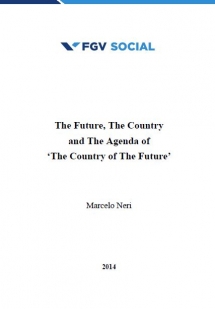
The Future, The Country and The Agenda of ‘The Country of The Future’ - Neri, Marcelo Cortes
Sobre o paper:
ABSTRACT
This paper explores the field of economics of happiness, addressing the perception of happiness of Brazilians in relation to time and the country’s collectivity, facing both the former and prospective public policies agenda. On the first point, Brazil is the five time undefeated world champion in future happiness. On a scale of 0 to 10, the Brazilian citizen awards an average score of 8.6 to their expectations for life satisfaction in 2015, the highest of all surveyed countries. The world average is 6.7. This subjective data is embodied by the expression “Brazil: the country of the future”, created 70 years ago. It also suggests reasons for why the country possesses a low savings rate and high interest rate. The youth, as the Brazilians, also believe that the best of life is yet to come, which reflects in the decline in the future life satisfaction of a global citizen along his life cycle. More than a country of young people in its demographic composition, Brazil is a country inhabited by young at heart. The average score for future life satisfaction has been above 9 among the Brazilians between 15 and 29 years of age in the five years analyzed, feat that has never been achieved by young people from more than one hundred countries analyzed. Thus, Brazil is five times world champion of future happiness, or youthful attitude. This enables to reconcile two qualifications often attributed to Brazil: “country of the future”, by some, and “young country”, by others. The other aspect addressed refers to a relatively low expectation of each Brazilian as to the general happiness of the nation, indicating a high dissonance of nearly 30% between the prospective vision of each Brazilian about their life and the vision of the whole country. In the interpretation proposed here, this second aspect would be consistent with greater importance in the national context of problems associated with collective action, problems which make the whole less than the sum of its parts, requiring mobilization and coordination of society. Examples such as high inflation and high inequality, which placed Brazil at the top of their respective world rankings, were recipients of major advances in Brazilian society over the past two decades. The new agenda of transformation that arises today in the country has this collective nature, such as the Brazilian urban problems, environmental and governance challenges.
REFERENCES
This paper was published in:
Book
NERI, Marcelo C. O Futuro, o País e a Agenda do "País do Futuro". In: Marcelo Côrtes Neri; Fábio Schiavinatto. (Org.). SIPS 2014: percepções da população sobre políticas públicas. 1ed.: , 2014, v.1, p.355-366.
Site
NERI, Marcelo C. O Futuro, o País e a Agenda do "País do Futuro". 2014. FGV Repositório Digital. Available online at: <http://bibliotecadigital.fgv.br/dspace/handle/10438/19361>
NERI, Marcelo C. The Future, The Country and The Agenda of ‘The Country of The Future’. 2014. FGV Social. Available online at: <https://cps.fgv.br/en/future-country-and-agenda-country-future>




